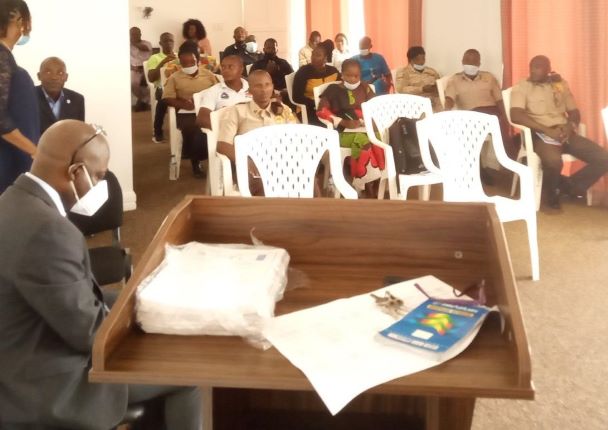Monrovia, Liberia- The Liberia Anti-Corruption Commission (LACC) with support from UNDP has conducted a two-day seminar for various sectors on anti-corruption best practices.
A press release from the UNDP said the event featured courses on anti-corruption for both the public and private sectors with the aim to build trust and boost business and economic activities. The seminar brought together a cross section of actors including government counterparts, business stakeholders, students, and Civil Society Organizations (CSOs) as part of activities marking the observance of Anti-Corruption Day on 9 December 2021.
At the opening of the exercise facilitated by experts in their field, the Executive Chairperson of LACC Counselor Edwin Martin emphasized that corruption is deadly and harmful to economic development. He assured the commission’s commitment to the fight against corruption.
Participants learned the roles and responsibilities of Liberia’s integrity institutions. Facilitator, Edwin Harris, Director General of the Financial Intelligence Unit (FIU) of Liberia spoke to the importance of recruiting persons with ‘integrity’, as an equal if not more important criteria, together with ‘education’ for the success of businesses, government institutions, CSOs and other organizations.
“Corruption affects the development and growth of the common people, creates inequalities and increases poverty gaps. Consequently, every citizen has a sacred duty and a binding obligation to join the fight against corruption by resisting and exposing corruption practices, wherever they are found,” remarked Rowland Cole, Chief Technical Advisor of UNDP Rule of Law Programme also speaking at the seminar.
The global theme for this year’s observance highlights the rights and responsibilities of everyone – including States, Government officials, civil servants, law enforcement officers, media representatives, the private sector, civil society, academia, the public and youth – in tackling corruption.
Similarly, the national theme emphasizes the need for individual responsibility to promote a culture of excellence, character building and integrity for national prosperity and development.
Corruption remains a complex social, political and economic phenomenon that affects all countries. It undermines democratic institutions, slows economic development and contributes to governmental instability.
In Liberia, corruption continues to permeate Liberian politics and the public service. Allegations of patronage, nepotism and cronyism plague politics, petty corruption is rife, and judicial independence is weak. Moral and financial support to public integrity institutions such as the Liberia Anti-Corruption Commission (LACC), Internal Auditing Agency (IAA) and others is also limited.
UNDP remains committed to supporting, working with key oversight and monitoring institutions to monitor, advocate, report, and act on corruption and human rights issues, to ensure compliance and accountability. Key institutions would include, e.g., the Independent National Commission on Human Rights, Liberia Anti-Corruption Commission, the Liberia National Bar Association, the media, and civil society organizations, including the Transparency International local chapter.
As part of other activities marking Anti-corruption Day, UNDP Liberia will host an online Development Dialogue on 8 December, open to the public and focusing on how the commitments found in Liberia’s laws and political speeches can translate into reality for citizens on the ground.
On 9 December, the UNDP Deputy Representative for Programme, Violet Baffour, will speak at the main Anti-Corruption Day event hosted by the LACC at the Monrovia City Hall.

